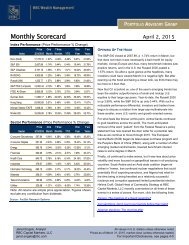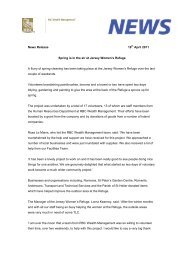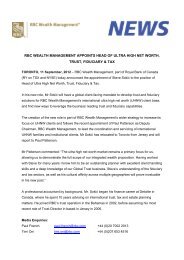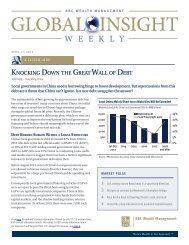Global Roundup - RBC Wealth Management
Global Roundup - RBC Wealth Management
Global Roundup - RBC Wealth Management
Create successful ePaper yourself
Turn your PDF publications into a flip-book with our unique Google optimized e-Paper software.
Coming up: International Securities<br />
Transactions (Dec 17); Retail Sales (Dec 20);<br />
Gross Domestic Product and Consumer Price<br />
Index (Dec 21).<br />
Europe<br />
The banking agreement between EU fi nance<br />
ministers is a meaningful deal in that it resolves<br />
a long-held disagreement between Germany<br />
and France over how far the ECB’s supervisory<br />
powers should stretch. The ECB will have direct<br />
oversight of banks with over €30 billion of assets<br />
or balance sheets accounting for 20% or more<br />
of national GDP, or around 200 banks. Smaller<br />
banks, like Germany’s savings banks, will be<br />
looked after by national supervisors, though the<br />
ECB will have power to step in.<br />
Key points, however, have been left<br />
unaddressed. How exactly will the ECB be able<br />
to override national supervisors of smaller<br />
banks? What is the timing of this agreement<br />
translating into direct recapitalisation of<br />
troubled banks by the European Stability<br />
Mechanism (the eurozone rescue fund)?<br />
With this unclear, it is too soon to claim the<br />
agreement is a game changer.<br />
Moreover, and crucially, while the ECB will<br />
now be in a position to identify problem banks<br />
and demand action, the responsibility of<br />
fi xing the problem remains with the member<br />
states. A true banking union would include two<br />
elements—a single resolution fund to clean<br />
up failed banks and a single deposit-insurance<br />
scheme to prevent bank runs. This is the only<br />
way to break the vicious circle between weak<br />
sovereigns and weak banks. The agreement is a<br />
step in the right direction, but doesn’t address<br />
the key issues.<br />
In other news, Bank of Canada Governor Mark<br />
Carney, who will take the helm of the Bank of<br />
England (BoE) in June 2013, spoke in Toronto<br />
on “Central Bank Policy Guidance.” According<br />
to Carney, when conventional monetary policy<br />
<strong>Global</strong> <strong>Roundup</strong><br />
70%<br />
60%<br />
50%<br />
40%<br />
30%<br />
Source - IMF World Economic Outlook, October 2012, <strong>RBC</strong> <strong>Wealth</strong><br />
<strong>Management</strong><br />
Actual data for 1980-2011, IMF estimates for 2012- 2017. Advanced<br />
Economies comprise the 35 most-developed nations.<br />
targeting infl ation has been exhausted after a<br />
long time of unprecedentedly low nominal rates,<br />
other monetary tools should be explored.<br />
Although at pains to explain that his comments<br />
were generic and not aimed at any one economy<br />
in particular, his speech was widely taken<br />
to suggest that the BoE should abandon<br />
infl ation targeting in favour of nominal GDP<br />
targets. Nominal GDP targets are no holy<br />
grail of monetary policy, however, as they may<br />
overlook credit growth and, thus, may not be<br />
consistent with fi nancial stability. Nevertheless,<br />
Mr. Carney’s novel, thinking-out-of-the-box<br />
approach should serve the Bank of England well<br />
when he takes over next year.<br />
Coming up: UK CPI (Dec 18); BoE minutes,<br />
Germany IFO (Dec 19).<br />
Asia Pacifi c<br />
Share of World GDP 1980-2017<br />
Developing economies are projected to account for<br />
more than half of world GDP beyond 2012.<br />
Advanced Economies<br />
Other Economies<br />
1980 1984 1988 1992 1996 2000 2004 2008 2012 2016<br />
Positive Chinese data and speculation about<br />
state institutions buying back shares helped<br />
the Shanghai Composite post its largest daily<br />
gain in three years on Friday, rising by 4.3% to<br />
2,150, the highest level since August 10. Trading<br />
volume was double the average over the<br />
previous 30 days.<br />
November’s Chinese industrial output climbed<br />
10% over the prior year, while retail sales grew<br />
14.9%. Chinese exports increased 2.9% in<br />
November, below the 9% forecast. However,<br />
with 2012 almost over, Chinese exports have<br />
risen by 7.3% year to date. The State Information<br />
Centre, a leading Chinese government think<br />
tank, forecasts exports and imports to rise by<br />
8% and 7.8%, respectively, in 2013. HSBC’s<br />
Flash December Manufacturing PMI for China<br />
came in at 50.9, indicating modest expansion in<br />
factory output. November’s 50.5 reading was the<br />
fi rst time the index surpassed 50 in over a year.<br />
These data points suggest Chinese economic<br />
activity continues to stabilize and support our<br />
view of China achieving 8.3% GDP growth in<br />
2013.<br />
Indonesia’s central bank maintained its reference<br />
interest rate at 5.75%, a record low, for the 10th<br />
straight meeting.<br />
Mergers and acquisitions news in the Energy<br />
sector dominated headlines. Chinese energy<br />
companies’ interest in Canadian assets<br />
continues. The Canadian government approved<br />
CNOOC’s (0883.HK) $15.1B acquisition of Nexen<br />
and Petroliam Nasional Bhd.’s $5.2B takeover<br />
of Progress Energy Resources. Following the<br />
decision, which outlined future limitations on<br />
takeovers of Canadian energy fi rms by foreign<br />
state-owned companies, PetroChina (0852.<br />
HK) announced it intends to purchase $1.2B,<br />
or 49.9%, of an Alberta-based shale formation<br />
owned by Encana.<br />
Coming up: China’s November property prices;<br />
Chinese foreign direct investment growth<br />
(expected -3.1%); Japan’s All Industry Activity<br />
Index (expected 0.2% growth); Japanese general<br />
election; Bank of Japan Target Rate (consensus:<br />
unchanged at 0.1%).<br />
4 GLOBAL INSIGHT WEEKLY – DECEMBER 14, 2012







